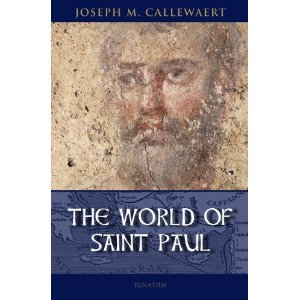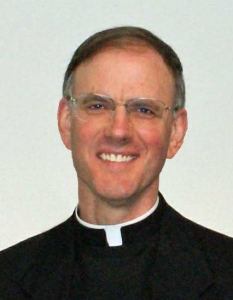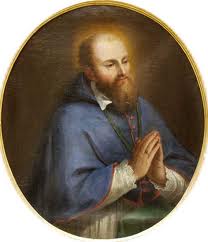The Ninth Monday in Ordinary Time – from the Gospel of Mark the full reading and reflection
“They will respect my beloved Son”
an excerpt from today’s reflection by Don Schwager: 
This parable speaks to us today as well. It richly conveys some important truths about God and the way he deals with his people. First, it tells us of God’s generosity and trust. The vineyard is well equipped with everything the tenants need. The owner went away and left the vineyard in the hands of the tenants. God, likewise trusts us enough to give us freedom to run life as we choose. This parable also tells us of God’s patience and justice. Not once, but many times he forgives the tenants their debts. But while the tenants take advantage of the owner’s patience, his judgment and justice prevail in the end. Jesus foretold both his death and his ultimate triumph. He knew he would be rejected and be killed, but he also knew that would not be the end. After rejection would come glory – the glory of resurrection and ascension to the right hand of the Father. How do we share in this glory? By submitting to Jesus’ kingly rule in our lives. Jesus promises that we will bear much fruit (certainly the fruit of peace, righteousness, and joy, and much more besides) if we abide in him (see John 15:1-11). The Lord also entrusts his gifts to each of us and he gives us work to do in his vineyard – the body of Christ. He promises that our labor will not be in vain if we persevere with faith to the end (see 1 Corinthians 15:58). We can expect trials and even persecution. But in the end we will see triumph. Do you labor for the Lord with joyful hope and with confidence in his triumph?
“Thank you, Lord Jesus Christ, for all the benefits which you have given us; for all the pains and insults which you have borne for us. O most merciful redeemer, friend, and brother, may we know you more clearly, love you more dearly, and follow you more nearly, for your own sake!” (Prayer of St. Richard of Chichester, 13th century)
for the full reflection visit : Daily Reading and Meditation
Tags: catholic, catholic podcast, catholic prayer, cathollc spirituality, don schwager, gospel of mark
This entry was posted on Monday, March 7th, 2011 at 12:03 am
You can follow any responses to this entry through the RSS 2.0 feed.
The Eighth Saturday in Ordinary Time – from the Gospel of Mark the full reading and reflection
“By what authority are you doing these things?”
an excerpt from today’s reflection by Don Schwager: 
Do you accept the authority of God’s word and submit to it with trust and obedience? Many religious leaders took offense at Jesus because they could not accept his authority. After Jesus had dramatically cleansed the temple of the traders and money-changers the Jewish leaders question Jesus to trap him. If he says his authority is divine they will charge him with blasphemy. If he has done this on his own authority they might well arrest him as a mad zealot before he could do more damage. Jesus, seeing through their trap, poses a question to them and makes their answer a condition for his answer. Did they accept the work of John the Baptist as divine or human? If they accepted John’s work as divine, they would be compelled to accept Jesus as the Messiah. They dodged the question because they were unwilling to face the truth. They did not accept the Baptist and they would not accept Jesus as their Messiah. Jesus told his disciples that “the truth will make you free†(John 8:31). Do you know the joy and freedom of living according to God’s word of truth?
“Lord Jesus, your word is life and truth. Instruct my heart that I may grow in the knowledge of your truth and live according to your wordâ€.
for the full reflection visit : Daily Reading and Meditation
Tags: catholic, catholic podcast, catholic prayer, cathollc spirituality, don schwager, gospel of mark
This entry was posted on Saturday, March 5th, 2011 at 8:01 am
You can follow any responses to this entry through the RSS 2.0 feed.
“The World of St. Paul” is a marvelous book, which accurately chronicles the life of St. Paul beautifully, but because of Joseph Callewaert’s writing we get glimpse of his heart as well. Joseph is an extraordinary man who is an ardent student of St. Paul, and he brings to us the fullness of his life and times in way that only someone who truly prayed with St. Paul could. It is a book for the common man, which is void of all the silly political agendas you find in some of the more recent biographies of this great saint by authors who have their “issues” with Christianity. Joseph is firmly anchored in the Church and it’s rich tradition and scholarship passed down through the ages. It was a wonderful read.
of Joseph Callewaert’s writing we get glimpse of his heart as well. Joseph is an extraordinary man who is an ardent student of St. Paul, and he brings to us the fullness of his life and times in way that only someone who truly prayed with St. Paul could. It is a book for the common man, which is void of all the silly political agendas you find in some of the more recent biographies of this great saint by authors who have their “issues” with Christianity. Joseph is firmly anchored in the Church and it’s rich tradition and scholarship passed down through the ages. It was a wonderful read.
[powerpress]
Tags: catholic, catholic podcast, catholic prayer, cathollc spirituality, Church, heart, ignatius press, joseph, Joseph Callewaert, st. paul
This entry was posted on Friday, March 4th, 2011 at 12:52 pm
You can follow any responses to this entry through the RSS 2.0 feed.
The Eighth Friday in Ordinary Time – from the Gospel of Mark the full reading and reflection
“My house shall be called a house of prayer for all the nations”
an excerpt from today’s reflection by Don Schwager: 
Jesus’ cleansing of the temple was another prophetic action. In this incident we see Jesus’ startling and swift action in cleansing the temple of those who were using it to exploit the worshipers of God. The money changers took advantage of the poor and forced them to pay many times more than was right– in the house of the Lord no less! Their robbery of the poor was not only dishonoring to God but 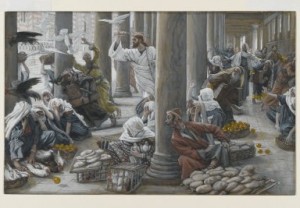 unjust toward their neighbor. In justification for his audacious action Jesus quotes from the prophets Isaiah (56:7) and Jeremiah (7:11). His act of judgment aims to purify the worship of God’s people and to discipline their erring ways.
unjust toward their neighbor. In justification for his audacious action Jesus quotes from the prophets Isaiah (56:7) and Jeremiah (7:11). His act of judgment aims to purify the worship of God’s people and to discipline their erring ways.
After this incident Jesus exhorts his disciples to “have faith in Godâ€. They are to pray with expectant faith no matter how difficult the situation may be. The phrase “to remove mountains†was a common Jewish expression for removing difficulties. A wise teacher who could solve difficulties was called a “mountain removerâ€. If we pray with faith God will give us the means to overcome difficulties and obstacles. If we want God to hear our prayers we must forgive those who wrong us as God has forgiven us. Do you pray with expectant faith?
“Lord Jesus, increase my faith and make me fruitful and effective in serving you. Help me to forgive others just as you have been merciful towards me”
for the full reflection visit : Daily Reading and Meditation
Tags: catholic, catholic podcast, catholic prayer, cathollc spirituality, don schwager, gospel of mark
This entry was posted on Friday, March 4th, 2011 at 8:27 am
You can follow any responses to this entry through the RSS 2.0 feed.
Dr. Scott Hahn has led so many into the heart of the Church through his great sharing of Holy Scripture. With “Signs of 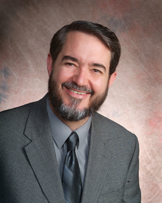 Life: 40 Catholic Customs and Their Biblical Roots” he takes us into the various “chambers of our home”, the Roman Catholic Church. He helps to understand the devotions, prayers, customs and many other spiritual practices which enrich our faith life. The book includes chapters including: the Sign of the Cross, the Mass, the Sacraments, praying with the saints, guardian angels, sacred images and relics, the celebration of Easter, Christmas, and other holidays, daily prayers, and much more. This work has helped me so much, and it’s the gift I give to anyone I know coming into full communion with Church. It’s fantastic!!!!
Life: 40 Catholic Customs and Their Biblical Roots” he takes us into the various “chambers of our home”, the Roman Catholic Church. He helps to understand the devotions, prayers, customs and many other spiritual practices which enrich our faith life. The book includes chapters including: the Sign of the Cross, the Mass, the Sacraments, praying with the saints, guardian angels, sacred images and relics, the celebration of Easter, Christmas, and other holidays, daily prayers, and much more. This work has helped me so much, and it’s the gift I give to anyone I know coming into full communion with Church. It’s fantastic!!!!
[powerpress]
Be sure to visit Dr. Hahn’s website for the St. Paul Center of Biblical Theology at 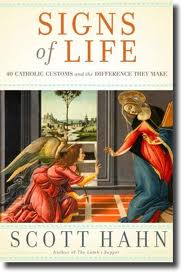 www.salvationhistory.com
www.salvationhistory.com
 Check out the book here
“Professor Hahn’s purpose is both devotional and apologetic. In showing how Catholic popular piety is scripturally grounded, he explains practices that shape Catholic life and help us grow in grace. This is a book that will be helpful to individuals and to the Church as a whole.” — Francis Cardinal George, OMI, Archbishop of Chicago
“Lifelong Catholics realize that it usually takes a convert to help us appreciate and better understand the customs and practices we too often take for granted. Scott Hahn does just that in this immensely reable yet substantive loving look at Catholic prayer, devotions, and beliefs.” — Most Reverend Timothy M. Dolan, Archbishop of New York
Tags: catholic, catholic podcast, catholic prayer, cathollc spirituality
This entry was posted on Thursday, March 3rd, 2011 at 10:22 am
You can follow any responses to this entry through the RSS 2.0 feed.
The enemy acts like a woman, in being weak against vigor and strong of will. Because, as it is the way of the woman when she is quarrelling with some man to lose heart, taking flight when the man shows her much courage: and on the contrary, if the man, losing heart, begins to fly, the wrath, revenge, and ferocity of the woman is very great, and so without bounds; in the same manner, it is the way of the enemy to weaken and lose heart, his temptations taking flight, when the person who is exercising himself in spiritual things opposes a bold front against the temptations of the enemy, doing diametrically the opposite. And on the contrary, if the person who is exercising himself commences to have fear and lose heart in suffering the temptations, there is no beast so wild on the face of the earth as the enemy of human nature in following out his damnable intention with so great malice.
[powerpress]
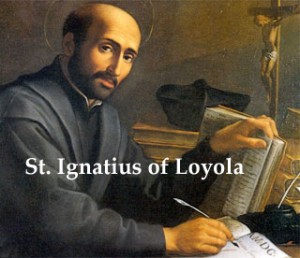 The Discernment of Spirits: Setting the Captives Free – Serves as an introduction to the Spiritual Exercises of St. Ignatius of Loyola
The Discernment of Spirits: Setting the Captives Free – Serves as an introduction to the Spiritual Exercises of St. Ignatius of Loyola
The 14 Rules for Discerning Spirits –
“The Different Movements Which Are Caused In The Soul”
as outlined by St. Ignatius of Loyola can be found here
Father Timothy M. Gallagher, O.M.V., was ordained in 1979 as a member of the Oblates of the Virgin Mary, a religious community dedicated to retreats and spiritual formation according to the Spiritual Exercises of St. Ignatius. Â Fr. Gallagher is featured on the EWTN series “Living the Discerning Life: Â The Spiritual Teachings of St. Ignatius of Loyola”.Â
For more information on how to obtain copies of Fr. Gallaghers’s various books and audio which are available for purchase, please visit  his  website: www.frtimothygallagher.org
 For the other episodes in this series visit
Fr. Timothy Gallagher’s “Discerning Hearts†page
Tags: catholic, catholic podcast, catholic prayer, cathollc spirituality, discernment of spirits, Father Timothy M. Gallagher, Timothy Gallagher
This entry was posted on Thursday, March 3rd, 2011 at 9:04 am
You can follow any responses to this entry through the RSS 2.0 feed.
The Eighth Thursday in Ordinary Time – from the Gospel of Mark the full reading and reflection
“What do you want me to do for you?”
an excerpt from today’s reflection by Don Schwager: 
Have you ever encountered a once in a life-time opportunity you knew you could not pass up? Such a moment came for a blind and destitute man, named Bartimaeus. He was determined to get near the one person who could meet his need. He knew who Jesus was and had heard of his fame for healing, but until now had no means of making contact with the Son of David, a clear reference and title for the Messiah. It took a lot of “guts” and persistence for Bartimaeus to get the attention of Jesus over the din of a noisy throng who crowded around Jesus as he made his way out of town. Why was the crowd annoyed with the blind man’s persistent shouts? He was disturbing their peace and interrupting Jesus’ discourse. It was common for a rabbi to teach as he walked with others. Jesus was on his way to celebrate the Passover in Jerusalem and a band of pilgrims followed him. When the crowd tried to silence the blind man he overpowered them with his emotional outburst and thus caught the attention of Jesus.
This incident reveals something important about how God interacts with us. The blind man was determined to get Jesus’ attention and he was persistent in the face of opposition. Jesus could have ignored or rebuffed him because he was disturbing his talk and his audience. Jesus showed that acting was more important than talking. This man was in desperate need and Jesus was ready, not only to empathize with his suffering, but to relieve it as well. A great speaker can command attention and respect, but a man or woman with a helping hand and a big heart is loved more. Jesus commends Bartimaeus for recognizing who he is with the eyes of faith and grants him physical sight as well. Do you recognize your need for God’s healing grace and do you seek Jesus out, like Bartimaeus, with persistent faith and trust in his goodness and mercy?
“Lord Jesus, may I never fail to recognize my need for your grace. Help me to take advantage of the opportunities you give me to seek your presence daily and to listen attentively to your word.”
for the full reflection visit : Daily Reading and Meditation
Tags: catholic, catholic podcast, catholic prayer, cathollc spirituality, don schwager, gospel of mark
This entry was posted on Thursday, March 3rd, 2011 at 12:33 am
You can follow any responses to this entry through the RSS 2.0 feed.
VATICAN CITY, 2 MAR 2011 (VIS) – During today’s general audience, which was held in the Paul VI Hall, the Pope spoke about St. Francis de Sales, bishop and doctor of the Church who lived in the sixteenth and seventeenth centuries.
Born in 1567 to a noble family in the Duchy of Savoy, while still very young Francis, “reflecting on the ideas of St. Augustine and St. Thomas Aquinas, underwent a profound crisis which led him to question himself about his own eternal salvation and about the destiny God had in store for him, experiencing the principle theological questions of his time as an authentic spiritual drama“. The saint “found peace in the radical and liberating truth of God’s love: loving Him without asking anything in return and trusting in divine love; this would be the secret of his life”.
Francis de Sales, the Holy Father explained, was ordained a priest in 1593 and consecrated as bishop of Geneva in 1602, “in a period in which the city was a stronghold of Calvinism. … He was an apostle, preacher, writer, man of action and of prayer; committed to realising the ideals of the Council of Trent, and involved in controversies and dialogue with Protestants. Yet, over and above the necessary theological debate, he also experienced the effectiveness of personal relations and of charity”.
With St. Jane Frances de Chantal he founded the Order of the Visitation, characterised “by a complete consecration to God lived in simplicity and humility“. St. Francis of Sales died in 1622.
In his book “An Introduction to the Devout Life”, the saint “made a call which may have appeared revolutionary at that time: the invitation to belong completely to God while being fully present in the world. … Thus arose that appeal to the laity, that concern for the consecration of temporal things and for the sanctification of daily life upon which Vatican Council II and the spirituality of our time have laid such emphasis”.
Referring then to the saint’s fundamental work, his “Treatise on the Love of God”, the Pope highlighted how “in a period of intense mysticism” it “was an authentic ‘summa’ and at the same time a fascinating literary work. … Following the model of Holy Scripture, St. Francis of Sales speaks of the union between God and man, creating a whole series of images of interpersonal relationships. His God is Father and Lord, Bridegroom and Friend”.
The treatise contains “a profound meditation on human will and a description of how it flows, passes and dies, in order to live in complete abandonment, not only to the will of God, but to what pleases Him, … to His pleasure. At the apex of the union with God, beyond the rapture of contemplative ecstasy, lies that well of concrete charity which is attentive to all the needs of others”.
Benedict XVI concluded his catechesis by noting that “in a time such as our own, which seeks freedom, … we must not lose sight of the relevance of this great master of spirituality and peace who gave his disciples the ‘spirit of freedom’, true freedom, at the summit of which is a fascinating and comprehensive lesson about the truth of love. St. Francis of Sales is an exemplary witness of Christian humanism. With his familiar style, with his parables which sometimes contain a touch of poetry, he reminds us that inscribed in the depths of man is nostalgia for God, and that only in Him can we find true joy and complete fulfilment”.
Check out other Discerning Hearts Posts on St. Francis de Sales
[p2p type=”id” value=”2281″]
[p2p type=”id” value=”2286″]
Tags: catholic, catholic podcast, catholic prayer, cathollc spirituality, doctor of the church, introduction to the devout life, st francis de sales
This entry was posted on Wednesday, March 2nd, 2011 at 11:42 am
You can follow any responses to this entry through the RSS 2.0 feed.
The Eighth Wednesday in Ordinary Time – from the Gospel of Mark the full reading and reflection
“We have left everything and followed you”
an excerpt from today’s reflection by Don Schwager: 
Was Jesus a pessimist or a stark realist? On three different occasions the Gospels record that Jesus predicted he would endure great suffering through betrayal, rejection, and the punishment of a cruel death. The Jews resorted to stoning and the Romans to crucifixion – the most painful and humiliating death they could devise for criminals they wanted to eliminate. No wonder the apostles were greatly distressed at such a prediction! If Jesus their Master were put to death, then they would likely receive the same treatment by their enemies. Jesus called himself the “Son of Man†because this was a common Jewish title for the Messiah. Why must the Messiah be rejected and killed? Did not God promise that his Anointed One would deliver his people from their oppression and establish a kingdom of peace and justice? The prophet Isaiah had foretold that it was God’s will that the “Suffering Servant†make atonement for sins through his suffering and death (Isaiah 53:5-12). Jesus paid the price for our redemption with his blood. Slavery to sin is to want the wrong things and to be in bondage to destructive desires. The ransom Jesus paid sets us free from the worst tyranny possible – the tyranny of sin and the fear of death. Jesus’ victory did not end with death but triumphed over the tomb. Jesus defeated the powers of death through his resurrection. Do you want the greatest freedom possible, the freedom to live as God truly meant us to live as his sons and daughters?
Jesus did the unthinkable! He wedded authority with selfless service and with loving sacrifice. Authority without sacrificial love is brutish and self-serving. Jesus also used stark language to explain what kind of sacrifice he had in mind. His disciples must drink his cup if they expect to reign with him in his kingdom. The cup he had in mind was a bitter one involving crucifixion. What kind of cup does the Lord have in mind for us? For some disciples such a cup entails physical suffering and the painful struggle of martyrdom. But for many, it entails the long routine of the Christian life, with all its daily sacrifices, disappointments, set-backs, struggles, and temptations. A disciple must be ready to lay down his or her life in martyrdom and be ready to lay it down each and every day in the little and big sacrifices required. An early church father summed up Jesus’ teaching with the expression: to serve is to reign with Christ. We share in God’s reign by laying down our lives in humble service as Jesus did for our sake. Are you willing to lay down your life and to serve others as Jesus did?
“Lord Jesus, your death brought life and freedom. Make me a servant of your love, that I may seek to serve rather than be served.â€
for the full reflection visit : Daily Reading and Meditation
Tags: catholic, catholic podcast, catholic prayer, cathollc spirituality, don schwager, gospel of mark
This entry was posted on Wednesday, March 2nd, 2011 at 6:16 am
You can follow any responses to this entry through the RSS 2.0 feed.
The Eighth Tuesday in Ordinary Time – from the Gospel of Mark the full reading and reflection
“We have left everything and followed you”
an excerpt from today’s reflection by Don Schwager: 
Right after a wealthy young man refused to follow Jesus, Peter, somewhat crudely wanted to know what he and the other disciples would get out of it since they had freely accepted Jesus’offer to follow him unconditionally. Jesus spoke with utter honesty: Those who left all for him would receive a hundred times more now, even in this life, as well as unending life in the age to come. Jesus’disciples can expect opposition and persecution from those who are opposed to Christ and his gospel.
Should we be surprised if we lose favor and experience ridicule, intimidation, and injury when we take a stand for truth and righteousness? In place of material wealth, Jesus promised his disciples the blessing and joy of rich fellowship with the community of believers. No earthly good or possession can rival the joy and bliss of knowing God and the peace and unity he grants to his disciples. The Lord wants to fill our hearts with the vision of heaven and with his joy and peace. Do you know the joy of following the Lord as his disciple? Ask the Holy Spirit to fill you with the joy of the gospel and the knowledge of God’s personal love.
“Lord Jesus, I want to follow you as your disciple and to love you wholeheartedly with all that I have. Fill my heart with faith, hope, and love that I may always find peace and joy in your presence.”
for the full reflection visit : Daily Reading and Meditation
Tags: catholic, catholic podcast, catholic prayer, cathollc spirituality, don schwager, gospel of mark
This entry was posted on Tuesday, March 1st, 2011 at 5:24 am
You can follow any responses to this entry through the RSS 2.0 feed.
Episode 6 – Regnum Novum: Bringing forth the New Evangelization through Catholic Social Teaching with Omar Guiterrez – Value 4 Truth, Freedom, Justice, and Love part 3 “Love”
– Value 4 Truth, Freedom, Justice, and Love part 3 “Love”
Discerning Hearts is blessed to present Omar F. A. Guiterrez, M.A. , Special Assistant to Archbishop George Lucas of the Archdiocese of Omaha, in a groundbreaking series which breaks open the heart of Catholic Social Doctrine.
We encourage you to visit “Regnum Novum – A New Kingdom: A Revolution” Omar Guiterrez’s blog site
 We live at a very special time. The confluence of many things has brought forth the clear need to be able to articulate the Social Teaching of the Catholic Church in a way that is accessible and applicable. This is not to be an effort where high-minded theories are to be bandied about. Rather, this is a time of opportunity wherein we can apply the Social Doctrine to the concrete so as to bring about a New Kingdom, a Revolution. – Omar G. from Regnum Novum
We live at a very special time. The confluence of many things has brought forth the clear need to be able to articulate the Social Teaching of the Catholic Church in a way that is accessible and applicable. This is not to be an effort where high-minded theories are to be bandied about. Rather, this is a time of opportunity wherein we can apply the Social Doctrine to the concrete so as to bring about a New Kingdom, a Revolution. – Omar G. from Regnum Novum
[powerpress]
From episode … 6. Truth, Freedom, Justice, and Love part 3 “Love“
These are the four values of the Social Teaching of the Catholic Church as they’re enumerated in the Compendium and as they were laid out by, again, Blessed Pope John XXIII in Mater et magistra and Pacem in terris. Without these values, the work of social justice becomes an albatross around our necks. It pulls us down, threatening to poison all the work we do, no matter how well intentioned.
We are seeking to build a civilization of love. Love is an encounter with God. Love begets love, and the experience of love can heal many more wounds than can socio-economic trivialities.
(Truth, Freedom and Justice are covered in other episodes)
Also visit Omar’s “Discerning Hearts” page Catholic Social Teaching 101
Tags: archdiocese of omaha, catholic, catholic podcast, catholic prayer, catholic social doctrine, cathollc spirituality, love, new evangelization, social justice, social teaching of the catholic church
This entry was posted on Monday, February 28th, 2011 at 3:04 pm
You can follow any responses to this entry through the RSS 2.0 feed.
Fr. Dwight Longenecker is Catholic priest and writer who has experienced an interesting journey of faith. Born into a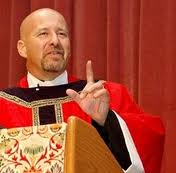 Evanglical Christian family in Pennsylvania, graduate from fundamentalist Bob Jones University in Florida, and he would later become an Anglican priest serving as a curate, a chaplain at Cambridge, and a country parson. Then, in 1995, he and his wife and family were received into the Roman Catholic Church. He spent the next ten years working as a freelance Catholic writer, contributing to over twenty-five magazines, papers and journals in Britain, Ireland and the USA.
Evanglical Christian family in Pennsylvania, graduate from fundamentalist Bob Jones University in Florida, and he would later become an Anglican priest serving as a curate, a chaplain at Cambridge, and a country parson. Then, in 1995, he and his wife and family were received into the Roman Catholic Church. He spent the next ten years working as a freelance Catholic writer, contributing to over twenty-five magazines, papers and journals in Britain, Ireland and the USA.
Fr. Longenecker has expanded and revised his book “More Christianity:  where he invites the readers to move from “Mere Christianity” to “More Christianity” in the Roman Catholic faith. Filled with every 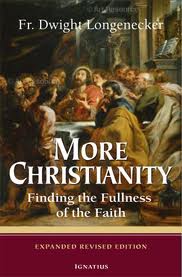 major aspect of our Catholic faith, Fr. Longenecker book serves, not only as resource to help Evangelicals to understand the Catholic faith, but also is excellent for Catholics who wish to deepen their own knowledge of the faith we profess.
major aspect of our Catholic faith, Fr. Longenecker book serves, not only as resource to help Evangelicals to understand the Catholic faith, but also is excellent for Catholics who wish to deepen their own knowledge of the faith we profess.
Visit Fr. Longenecker’s blog “Standing on My Head” to learn more about this and other books, as well as so much more
[powerpress]
Tags: catholic, catholic apologetics, catholic apologists, catholic podcast, catholic prayer, cathollc spirituality, Evanglical Christian, faith, ignatius press, roman catholic church, Visit Fr
This entry was posted on Monday, February 28th, 2011 at 2:53 pm
You can follow any responses to this entry through the RSS 2.0 feed.
The Eighth Monday in Ordinary Time – from the Gospel of Mark the full reading and reflection
“Whoever does not receive the kingdom of God like a child shall not enter it”
an excerpt from today’s reflection by Don Schwager: 
Those who are generous towards God and towards their neighbor find that they cannot outgive God in his generosity towards us. God blesses us with the priceless treasures of his kingdom – freedom from fear and the griping power of sin, selfishness and pride which block his love and grace in our lives; freedom from loneliness, isolation and rejection which keep his children from living together in love, peace, and unity; and freedom from hopelessness, despair, and disillusionment which blind our vision of God’s power to heal every hurt, bind every wound, and remove every blemish which mar the image of God within us. God offers us treasure which money cannot buy. He alone can truly satisfy the deepest longing and desires of our heart. Are you willing to part with anything that might keep you from seeking true joy with Jesus?
Why does Jesus issue such a strong warning to the rich (as well as to the rest of us who desire to be rich)? Was he really against wealth? We know that Jesus was not opposed to wealth per se, nor was he opposed to the wealthy. He had many friends who were well-to-do,  including some notorious tax collectors! One even became an apostle! Jesus’ warning reiterated the teaching of the Old Testament wisdom: Better is a poor man who walks in his integrity than a rich man who is perverse in his ways (Proverbs 28:6; see also Psalm 37:16). Do not wear yourself out to get rich; be wise enough to desist (Proverbs 23:4). Jesus seems to say that it is nearly impossible for the rich to live as citizens of God’s kingdom. The camel was regarded as the largest animal in Palestine. The “eye of the needle” could be interpreted quite literally or it could figuratively describe the narow and low gate of the city walls which was used by travellers when the larger public gate was locked after dark. A normal sized man had to “lower” himself to enter that gate. A camel would literally have to knell and crawl through it. Why is Jesus so cautious about wealth? Wealth can make us falsely independent. The church at Laodicea was warned about their attitude towards wealth and a false sense of security: “For you say, I am rich, I have prospered, and I need nothing” (Revelations 3:17). Wealth can also lead us into hurtful desires and selfishness (see 1 Timothy 6:9-10). Look at the lesson Jesus gave about the rich man and his sons who refused to aid the poor man Lazarus (see Luke 16:19ff). They also neglected to serve God. The scriptures give us a paradox: we lose what we keep and we gain what we give away. Generosity will be amply repaid, both in this life and in eternity (Proverbs 3:9-10, Luke 6:38). Jesus offers us an incomparable treasure which no money can buy and no thief can steal. The thing we most set our heart on is our highest treasure. Material wealth will shackle us to this earth unless we guard our hearts and set our treasure on God and his everlasting kingdom. Where is your treasure?
including some notorious tax collectors! One even became an apostle! Jesus’ warning reiterated the teaching of the Old Testament wisdom: Better is a poor man who walks in his integrity than a rich man who is perverse in his ways (Proverbs 28:6; see also Psalm 37:16). Do not wear yourself out to get rich; be wise enough to desist (Proverbs 23:4). Jesus seems to say that it is nearly impossible for the rich to live as citizens of God’s kingdom. The camel was regarded as the largest animal in Palestine. The “eye of the needle” could be interpreted quite literally or it could figuratively describe the narow and low gate of the city walls which was used by travellers when the larger public gate was locked after dark. A normal sized man had to “lower” himself to enter that gate. A camel would literally have to knell and crawl through it. Why is Jesus so cautious about wealth? Wealth can make us falsely independent. The church at Laodicea was warned about their attitude towards wealth and a false sense of security: “For you say, I am rich, I have prospered, and I need nothing” (Revelations 3:17). Wealth can also lead us into hurtful desires and selfishness (see 1 Timothy 6:9-10). Look at the lesson Jesus gave about the rich man and his sons who refused to aid the poor man Lazarus (see Luke 16:19ff). They also neglected to serve God. The scriptures give us a paradox: we lose what we keep and we gain what we give away. Generosity will be amply repaid, both in this life and in eternity (Proverbs 3:9-10, Luke 6:38). Jesus offers us an incomparable treasure which no money can buy and no thief can steal. The thing we most set our heart on is our highest treasure. Material wealth will shackle us to this earth unless we guard our hearts and set our treasure on God and his everlasting kingdom. Where is your treasure?
“Lord Jesus, you have captured our hearts and opened to us the treasures of heaven. May you always be my treasure and delight and may nothing else keep me from giving you my all.”
for the full reflection visit : Daily Reading and Meditation
Tags: catholic, catholic podcast, catholic prayer, cathollc spirituality, don schwager, eye of the needle, gospel of mark
This entry was posted on Monday, February 28th, 2011 at 7:59 am
You can follow any responses to this entry through the RSS 2.0 feed.
“Sell what you have, and give to the poor, and you will have treasure in heaven”
an excerpt from today’s reflection by Don Schwager: 
What does the expression “serving two masters†and “being anxious†have in common? They both have the same root problem – being divided within oneself. The root word for “anxiety†literally means “being of two minds.†An anxious person is often “tossed to and fro†and paralyzed by fear, indecision, and insecurity. Fear of some bad outcome cripples those afflicted with anxiety. It’s also the case with someone who wants to live in two opposing kingdoms – God’s kingdom of light, truth, and goodness or Satan’s kingdom of darkness, sin, and deception – following God’s standards and way of happiness or following the world’s standards of success and happiness. Who is the master in charge of your life? Our “master†is whatever governs our thought-life, shapes our ideals, and controls the desires of our heart and the values we choose to live by. We can be ruled by many different things – the love of money and possessions, the power of position and prestige, the glamor of wealth and fame, and the driving force of unruly passions, harmful desires, and addictive cravings. Ultimately the choice of who is our master boils down to two: God or “mammonâ€. What is mammon? “Mammon†stands for “material wealth or possessions†or whatever tends to “control our appetites and desires.â€
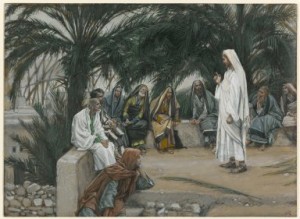 There is one master alone who has the power to set us free from slavery to sin, fear, pride, and greed, and a host of other hurtful desires. That master is the Lord Jesus Christ who alone can save us from all that would keep us bound up in fear and anxiety. Jesus used an illustration from nature – the birds and the flowers – to show how God provides for his creatures in the natural order of his creation. God provides ample food, water, light, and heat to sustain all that lives and breathes. How much more can we, who are created in the very image and likeness of God, expect our heavenly Father and creator to sustain not only our physical bodies, but our mind, heart, and soul as well? God our Father is utterly reliable because it is his nature to love, heal, forgive, and make whole again. Jesus taught his disciples to pray with confidence to their heavenly Father: Give us this day our daily bread. What is bread, but the very staple of life and symbol of all that we need to live and grow. Anxiety is neither helpful nor necessary. It robs us of faith and confidence in God’s help and it saps our energy for doing good. Jesus admonishes his followers to put away anxiety and preoccupation with material things and instead to seek first the things of God – his kingdom and righteousness. Anxiety robs the heart of trust in the mercy and goodness of God and in his loving care for us. God knows our needs even before we ask and he gives generously to those who trust in him. Who is your master – God or mammon?
There is one master alone who has the power to set us free from slavery to sin, fear, pride, and greed, and a host of other hurtful desires. That master is the Lord Jesus Christ who alone can save us from all that would keep us bound up in fear and anxiety. Jesus used an illustration from nature – the birds and the flowers – to show how God provides for his creatures in the natural order of his creation. God provides ample food, water, light, and heat to sustain all that lives and breathes. How much more can we, who are created in the very image and likeness of God, expect our heavenly Father and creator to sustain not only our physical bodies, but our mind, heart, and soul as well? God our Father is utterly reliable because it is his nature to love, heal, forgive, and make whole again. Jesus taught his disciples to pray with confidence to their heavenly Father: Give us this day our daily bread. What is bread, but the very staple of life and symbol of all that we need to live and grow. Anxiety is neither helpful nor necessary. It robs us of faith and confidence in God’s help and it saps our energy for doing good. Jesus admonishes his followers to put away anxiety and preoccupation with material things and instead to seek first the things of God – his kingdom and righteousness. Anxiety robs the heart of trust in the mercy and goodness of God and in his loving care for us. God knows our needs even before we ask and he gives generously to those who trust in him. Who is your master – God or mammon?
“Lord Jesus, free me from needless worries and help me to put my trust in you. May my first and only concern be for your glory and your kingdom of peace and righteousness. Help me to live each day and moment with trust and gratitude for your providential care for me.â€
for the full reflection visit : Daily Reading and Meditation
Tags: catholic, catholic podcast, catholic prayer, cathollc spirituality, don schwager, gospel of matthew
This entry was posted on Sunday, February 27th, 2011 at 2:51 pm
You can follow any responses to this entry through the RSS 2.0 feed.
Episode 15 -The Way of Mystery: The Eucharist and Moral Living– The journey begins into the unitive way…the beginning of falling in love with God. Combined with the entry into the sacramental life, the living out the moral life becomes more than meeting a “goal”, but becomes a “way” of life.
falling in love with God. Combined with the entry into the sacramental life, the living out the moral life becomes more than meeting a “goal”, but becomes a “way” of life.
[powerpress]
Deacon James Keating, PhD, the director of Theological Formation for the Institute for Priestly Formation, located at Creighton University, in Omaha, is making available to â€Discerning Hearts†and all who listen, his series of programs entitled “The Way of Mysteryâ€.
 The Vatican II documents remind us that the spiritual journey is not made in a vacuum, that God has chosen to save us, not individually, but as The People of God. The Eucharist must help Christians to make their choices by discerning out of Christ’s paschal mystery. For this process to take place, however, Christians must first understand how the Eucharist puts them in touch with Christ’s passion, death, and resurrection, and what concrete implications being in touch with this mystery has for their daily lives.
The Vatican II documents remind us that the spiritual journey is not made in a vacuum, that God has chosen to save us, not individually, but as The People of God. The Eucharist must help Christians to make their choices by discerning out of Christ’s paschal mystery. For this process to take place, however, Christians must first understand how the Eucharist puts them in touch with Christ’s passion, death, and resurrection, and what concrete implications being in touch with this mystery has for their daily lives.
For more information on the “Institute of Priestly Formation†and for other material available by Deacon Keating, just click here
Don’t forget to pickup a copy of “Communion with Christ†, it is one of the best audio sets on prayer…ever!
Check out Deacon Keating’s “Discerning Heart†page
Tags: catholic, catholic podcast, catholic prayer, cathollc spirituality, creighton university, Deacon James Keating, institute for priestly formation, moral life, paschal mystery, sacramental life, spiritual journey, the eucharist, the unitive way, theological formation, way of mystery
This entry was posted on Saturday, February 26th, 2011 at 8:08 am
You can follow any responses to this entry through the RSS 2.0 feed.

